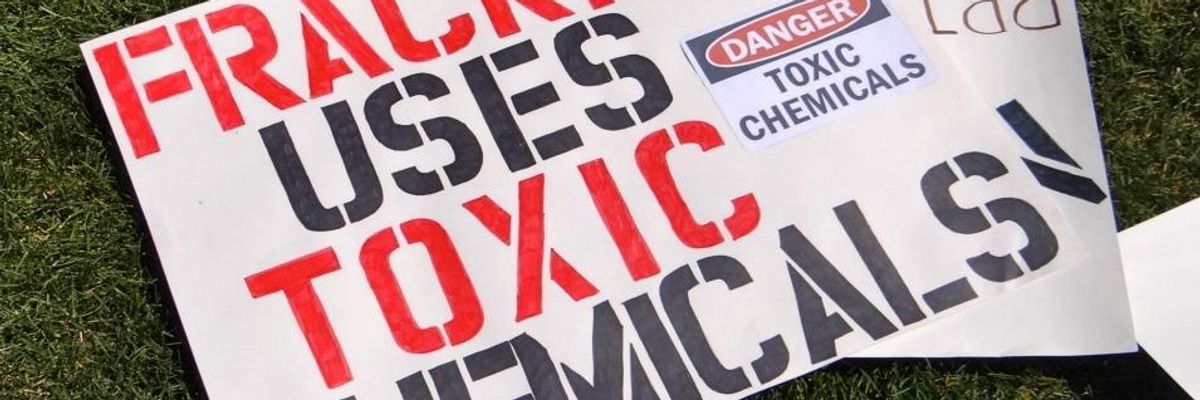A coalition of nine environmental and open-government groups sued the Environmental Protection Agency on Wednesday for its decades-long failure to require the oil and gas extraction industry to disclose the toxic chemicals released by fracking, natural gas processing, and related operations.
The lawsuit (pdf) follows a petition that the groups filed in October 2012, requesting that EPA require the oil and gas industry to disclose such pollution to the Toxics Release Inventory (TRI), a federal public pollution database established in 1986 to inform the public about the industrial release of carcinogenic chemicals (such as benzene) in the wake of the deadly 1984 Bhopal disaster in India, in which toxic gases from a chemical plant killed thousands of local residents. Entities such as oil refineries, petrochemical plants, power plants, and mining companies have had to comply with these 'right-to-know' rules for years--decades, in some cases.
"This is the last major sector that has not been included in the inventory," the lead attorney in the suit, Adam Korn of the Environmental Integrity Project, told the Houston Chronicle. "We're just saying to the EPA, look again. The industry is different now."
By EPA's own estimates, the oil and gas extraction industry emits at least 127,000 tons of hazardous air pollutants every year, all of which are TRI-listed chemicals.
As the lawsuit points out, the number of fracking and drilling operations in the U.S. has increased "dramatically" in the last decade. "Simultaneously, the volume and variety of toxic chemicals used by the industry has expanded significantly," it notes.
However, "[d]ue to EPA's long inaction, the oil and gas extraction industry remains exempt from the Toxics Release Inventory, one of our nation's most basic toxic reporting mechanisms," Kron said. "The Toxic Release Inventory requires just one thing: annual reporting to the public. This reporting is critical to health, community planning, and informed decision making. Whether to add the oil and gas extraction industry shouldn't even be a question at this point."
In January 2014 the Environmental Integrity Project collected air emissions data from six oil and gas "boom" states--Colorado, Louisiana, North Dakota, Pennsylvania, Texas, and Wyoming--and found that nearly 400 large oil and gas extraction facilities are emitting a combined 8.5 million tons of TRI-listed toxic chemicals each year in those states.
"What we are asking for is actually very simple: treat fracking just like every other industrial operation that releases air and water pollution," said Zac Trahan, program director with Texas Campaign for the Environment, one of the groups involved in the suit. "This right-to-know loophole is a perfect example of how fracking is currently given special exceptions to get around our nation's most important environmental laws. If oil and gas drilling and extraction is as safe as industry lobbyists say it is, they should be able to follow the same rules every other industry already does."
Barbara Jarmoska, of the Pennsylvania-based Responsible Drilling Alliance, added:
Neither local residents nor elected officials were prepared for the sudden and dramatic industrial transformation of Pennsylvania's Marcellus Shale region. The health and environmental costs of the industry have not been properly nor thoroughly evaluated, and the whole truth of the industry's toxic burden has been manipulated and undermined by an aggressive, industry-funded marketing campaign of disinformation. Because of this, the addition of the oil and gas extraction industry to the Toxics Release Inventory is paramount. Increased and regular reporting by facilities in the oil and gas industry will result in more precise information on the type and amount of toxic chemicals released to the air, water, and land.
Having received no formal response to their 2012 petition, the groups are asking the courts to order EPA to issue a final response within a court-imposed deadline of 60 days.
As Matthew McFeeley, staff attorney for the Natural Resources Defense Council, said, "It's high time for EPA to stop giving the oil and gas industry special treatment."
